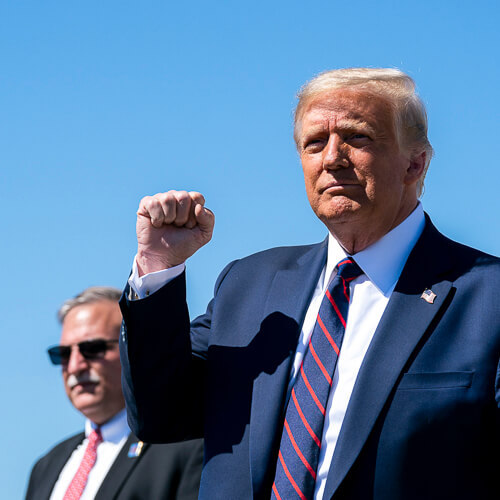
TikTok has taken its battle against the US government to court, challenging the Trump administration's emergency order against the video social network.
On August 6, the US president issued an order requiring ByteDance, Beijing-based owner of the video-sharing social network, to sell its US operations to an American buyer or close them.
TikTok currently has more than 80 million users in the US.
Figure 1:  Fight club: Trump's war on China looks like it will run and run, and everyone is talking about it.
Fight club: Trump's war on China looks like it will run and run, and everyone is talking about it.
(Source: White House)
In the order, the Trump administration said TikTok automatically captured large swathes of its users' information, including location data, and browsing and search histories.
China's government could use the information to "track the location of Federal employees and contractors, build dossiers of personal information for blackmail, and conduct corporate espionage," it said.
In its submission to the US federal court in San Francisco, ByteDance said the US government was stripping the app's US users and employees of their rights, without due process or evidence it was endangering US users' data.
US users' information is stored in Northern Virginia and Singapore, the company added.
Tick, tock
Before the White House order, Microsoft was looking into purchasing the TikTok service in the US, Canada, Australia, and New Zealand, and said its CEO Satya Nadella had a conversation on the subject with President Trump.
It would ensure US users' private data would be transferred to US data centers, and deleted from servers outside the US, according to the tech giant.
Microsoft was reportedly exploring offers in the neighborhood of $50 million, and considering including other companies in a joint venture, on a minority basis.
California-based cloud provider Oracle also said it was exploring making an offer, with Twitter also said to be interested.
Microsoft has also explored purchasing TikTok's operations in India, formerly TikTok's biggest market.
The platform has been banned in India since the end of June, as relations between Delhi and Beijing grew frosty. India's Reliance Jio was also rumored to be interested.
Trump taking a byte
President Trump had also said any purchase deal would need to include "a substantial amount of money" going to the US government.
As he makes toughness on China a touchstone of his reelection bid, Chinese tech companies are quickly learning how to play US politics.
According to its disclosures, ByteDance spent $800,000 in lobbying efforts in the US in the first half of 2020.
Want to know more about 5G? Check out our dedicated 5G content channel here on Light Reading.
It had plans to add 10,000 jobs to its current 1,4000 in the US, TikTok says, and in May hired a US CEO, Disney's former head of streaming, Kevin Mayer.
The dispute is fallout from a wider US-China trade war – and Trump's assault on Chinese mobile giant Huawei and anyone associated with it.
An open question is how much the TikTok debacle will spread to encompass other Chinese tech companies with US operations, and how heavily US companies will be targeted in retaliation.
WeChat, a chat messaging service owned by Shenzhen-based Tencent, was also the subject of an executive order on the same day. However according to Bloomberg, the Trump administration has been quietly reassuring Apple and others with large Chinese operations that they can still do business with WeChat in China.
Meanwhile, a group of US WeChat users has asked a federal court in San Francisco to block a federal ban, calling the ban an attack on their freedom of speech.
With 1.2 billion users worldwide, WeChat has 19 million in the US, and for many it represents the only way of messaging with family and friends in China.
Alibaba's head, Daniel Zhang, also has played the jobs card, pointing out in his most recent earnings call that Alibaba's primary US focus is to "support American brands, retailers, small businesses and farmers."
Meanwhile, in the Oval Office, President Trump may be eating on paper plates as he tweets.
After all, he doesn't get on with China.
Related posts:
— Pádraig Belton, contributing editor, special to Light Reading
Read more about:
AsiaAbout the Author(s)
You May Also Like




_International_Software_Products.jpeg?width=300&auto=webp&quality=80&disable=upscale)







